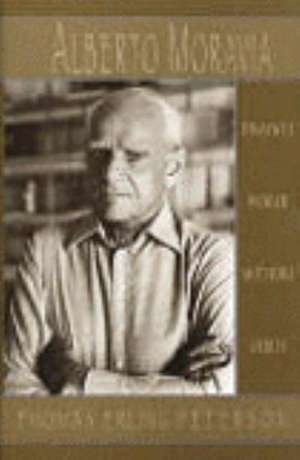World Authors Series: Alberto Moravia: Twayne's World Authors, cartea 861
Autor Thomas Erling Petersonen Limba Engleză Hardback – 31 mai 1996
Din seria Twayne's World Authors
-
 Preț: 486.49 lei
Preț: 486.49 lei -
 Preț: 489.92 lei
Preț: 489.92 lei -
 Preț: 375.22 lei
Preț: 375.22 lei -
 Preț: 464.92 lei
Preț: 464.92 lei -
 Preț: 464.54 lei
Preț: 464.54 lei -
 Preț: 465.13 lei
Preț: 465.13 lei -
 Preț: 376.75 lei
Preț: 376.75 lei -
 Preț: 377.52 lei
Preț: 377.52 lei - 23%
 Preț: 427.79 lei
Preț: 427.79 lei -
 Preț: 462.41 lei
Preț: 462.41 lei -
 Preț: 374.23 lei
Preț: 374.23 lei -
 Preț: 375.22 lei
Preț: 375.22 lei -
 Preț: 375.98 lei
Preț: 375.98 lei -
 Preț: 373.09 lei
Preț: 373.09 lei -
 Preț: 377.72 lei
Preț: 377.72 lei -
 Preț: 378.48 lei
Preț: 378.48 lei -
 Preț: 375.39 lei
Preț: 375.39 lei -
 Preț: 375.39 lei
Preț: 375.39 lei -
 Preț: 373.47 lei
Preț: 373.47 lei -
 Preț: 375.39 lei
Preț: 375.39 lei -
 Preț: 483.60 lei
Preț: 483.60 lei -
 Preț: 485.29 lei
Preț: 485.29 lei -
 Preț: 487.42 lei
Preț: 487.42 lei -
 Preț: 484.53 lei
Preț: 484.53 lei -
 Preț: 485.90 lei
Preț: 485.90 lei -
 Preț: 485.51 lei
Preț: 485.51 lei -
 Preț: 488.40 lei
Preț: 488.40 lei -
 Preț: 484.53 lei
Preț: 484.53 lei -
 Preț: 487.81 lei
Preț: 487.81 lei -
 Preț: 487.25 lei
Preț: 487.25 lei -
 Preț: 486.28 lei
Preț: 486.28 lei -
 Preț: 483.60 lei
Preț: 483.60 lei -
 Preț: 482.23 lei
Preț: 482.23 lei -
 Preț: 486.28 lei
Preț: 486.28 lei -
 Preț: 482.23 lei
Preț: 482.23 lei -
 Preț: 513.42 lei
Preț: 513.42 lei -
 Preț: 484.37 lei
Preț: 484.37 lei -
 Preț: 487.25 lei
Preț: 487.25 lei
Preț: 375.22 lei
Nou
Puncte Express: 563
Preț estimativ în valută:
71.80€ • 75.16$ • 59.41£
71.80€ • 75.16$ • 59.41£
Carte indisponibilă temporar
Doresc să fiu notificat când acest titlu va fi disponibil:
Se trimite...
Preluare comenzi: 021 569.72.76
Specificații
ISBN-13: 9780805782967
ISBN-10: 0805782966
Pagini: 170
Dimensiuni: 148 x 221 x 20 mm
Greutate: 0.37 kg
Ediția:New.
Editura: Twayne Publishers
Seria Twayne's World Authors
ISBN-10: 0805782966
Pagini: 170
Dimensiuni: 148 x 221 x 20 mm
Greutate: 0.37 kg
Ediția:New.
Editura: Twayne Publishers
Seria Twayne's World Authors
Textul de pe ultima copertă
Widely acknowledged as a major voice in contemporary Italian literature, Alberto Moravia (1907-1990) published more than 30 books in his lifetime. A novelist, short story writer, and essayist, Moravia is renowned for his exquisite portrayals of the decadence, shallow values, and obsessions of the sex and money driven Italian middle class. His first novel, The Time of Indifference (1929), was an immediate sensation; its descendants, among them The Conformist, The Empty Canvas, and The Lie, positioned him firmly as a master of the narrative art, a moralist, and a realist applauded for his humanism and his powers of observation, deduction, and analysis. Moravia also explored characters from the Italian working class in The Woman of Rome, Two Women, and Roman Tales. Censored in the 1930s and 1940s by both Mussolini's fascists and the Vatican, Moravia is credited with developing an Italian literature of existentialism and with placing Italian literature in a European context. With Alberto Moravia, the teacher and scholar Thomas Erling Peterson contributes the first study of the writer to be published since Moravia's death in 1990. Arguing that Moravia was an intellectual and a craftsman faithful to his interior life and inspiration while active as a public figure in Italian society, Peterson presents an accessible, carefully structured analysis of Moravia's major novels, short fiction, and essays and his lesser known works of drama, criticism, and journalism. Approaching his subject textually and contextually, Peterson offers valuable insights into the times and processes that motivated Moravia, emphasizing moral issues and defining themes such as corruption in postwar Italian society, ambiguities of sexual identity, dilemmas of the alienated artist, and the courage of women in the Italian proletariat. In an introductory chapter, Peterson offers helpful biographical information detailing, for instance, the role of a lengthy childhood illness played in Moravia's development as a writer and the role Moravia's antinuclear views played in his decision to become a member of the European Parliament in 1984. Next, exploring the process of literary creation as it unfolds book by book, Peterson helps readers appreciate Moravia's moral constancy and objectivity. "Moravia (gave) us a diagnosis more than a prognosis," Peterson states," . . . and provided a critical reference point for other artists and intellectuals." With this lucid, historically balanced study, both scholars and students of Italian language and literature, as well as general readers, have an excellent tool for approaching Moravia's work. Included are a Preface, a Chronology, Notes and References, Selected Bibliography, and Index.
